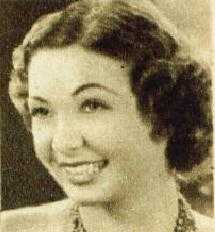Steffi Duna
| Steffi Duna | |
|---|---|
 | |
| Born |
Stephanie Berindey February 8, 1910 Budapest, Austro-Hungarian Empire |
| Died |
April 22, 1992 (aged 82) Beverly Hills, California, U.S. |
| Years active | 1932–1940 |
| Spouse(s) |
Dennis O'Keefe (1940–1968) (his death) John Carroll (1935–1936) (divorced) |
Steffi Duna (8 February 1910 – 22 April 1992) was a Hungarian-born film actress popular in American and British films during the 1930s.
Hungarian Dancer
Born Stephanie Berindey in Budapest of Czech extraction, Duna started dancing at the age of nine and first attracted attention as a thirteen-year-old ballet dancer in Europe. Duna made her first stage appearance performing dramatized fairy tales at the Children's Theater of Budapest. Initially opposed to the idea, her father sent her to the best schools in the Hungarian capitol to learn dancing and soon she had danced in most of the capitals of Europe. In 1932, she appeared on the London stage in the Revue Words and Music by Noël Coward, being one of the four actresses to create the song Mad about the Boy.
Movie Actress
When she first came to Hollywood in 1932, Duna could not speak a word of English. She made up her mind to learn quickly. Directors advised her to stay away from her Hungarian friends to speed up her learning of English. Within a few years she could speak six different languages.
During the 1930s Duna played a variety of nationalities. However, despite her European background, she was often cast as fiery Latin femme fatales in films that made full use of her exotic and glamorous persona, such as La Cucaracha (1934) the first live-action short film made in three-strip Technicolor.
She made her film debut in The Indiscretions of Eve (1932) in the starring role (along with Jessica Tandy also making her debut). Signed by RKO Radio Pictures, Duna played Guninana, the Eskimo wife of Francis Lederer, in Man of Two Worlds (1934). Also Czech, Lederer had performed with Duna in the Berlin, Germany presentation of Die Wunderbar. In 1936, she played the part of Nedda in the British film version of 'Pagliacci', starring Richard Tauber. "I conquer the Sea" (1936) is considered by some to be a minor classic.
The films in which she played lead roles such as Panama Lady (1939) with Lucille Ball, were popular but did not make her a major star. Her best remembered films are arguably some of those in which she played key supporting roles, such as Anthony Adverse (1936) and Waterloo Bridge (1940). In Anthony Adverse Duna performed as a halfcaste in the African sequence.
Marriage
Duna was married first to the actor John Carroll. The two performed together in Hi, Gaucho (1935). They had a daughter named Juliena Lefaye. They divorced in 1938. In 1940 she married actor Dennis O'Keefe; they remained together until his death. She retired from films in 1940, and died in Beverly Hills, California in 1992, aged 82.
Sources
- Bismarck Tribune, "Steffi Duna Important Character In Picture", Wednesday, November 20, 1935, Page 8.
- Hammond Times, "Hollywood", March 16, 1939, Page 35.
- Oakland Tribune, "Money-Important In Marriage, Or Is It?", Sunday, November 26, 1939, Page 79.
- Salisbury Times, "Dennis O'Keefe Picks That As Official Name", Monday Evening, August 28, 1944, Page 5.
References
External links
- Steffi Duna at the Internet Movie Database
- Steffi Duna at the Internet Broadway Database
- Steffi Duna at Find a Grave
|